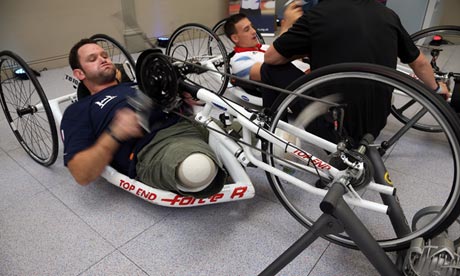
Exactly three years ago Sergeant Simon Harmer was a month into a tour of Afghanistan when he stepped on a roadside bomb during a routine patrol. His right leg was blown off and his left leg had to be amputated back at camp.
On Thursday however, 36-year-old Harmer was taking a tour of state-of-the-art facilities at the Help For Heroes flagship recovery centre in Wiltshire and dreaming of sporting glory. "I want to try to become a Paralympian," he said.
"My swimming is pretty good at the moment – I'm beating able-bodied competitors. But it could be cycling or canoeing. I'm definitely going to give it a go. I don't want to look back in 20 years time and regret not having tried it. I'm excited beyond words at this place. They're going to struggle to get me of the door."
The tour was the first glimpse of the new facilities at Tedworth House in Tidworth, one of the charity's four UK recovery centres due to fully open next year and set to care for and inspire injured service personnel for the next century.
There is an excellent gym, an adjustable multi-depth pool, even an indoor ski stimulator. Within five minutes' drive, 19 Paralympian sports are on offer, from cycling to canoeing and horse-riding.
The facilities at Tedworth, a grand house and grounds that is being leased from the Ministry of Defence (MoD) for a nominal £1 a year, also include an accommodation block of 34 rooms for service personnel and their families. In addition, there are offices for non-sporting staff who can advise on healthcare, education, employment and finance.
But sport is king. It is not just about physical exercise as a means to recovery; it is about sport helping give those who have suffered terrible injuries something to aspire to.
"Sport can be an incredible way of moving on," said Martin Colclough, head of sports recovery at Help For Heroes and a member of the ParalympicsGB support staff. "It's not just about the elite athletes, the ones who want to make the Paralympics. Everyone has a their own idea of success, their own idea of what a personal best looks like."
So for one person, they might want to get to a point where they can ride a bicycle again so that they can teach a son to ride. Colclough came across one injured soldier who wanted to learn to ski in order that he could propose to his girlfriend on a ski-slope. "That's a beautiful aim," he said.
Rory Mckenzie, a 30-year-old member of the Royal Army Medical Corps, described vividly how one moment he was at the top of his game, physically and mentally. He was a super-fit rugby player and knew his job as a medic inside out. Then came the explosion that changed his life. He lost his right leg to a roadside bomb in Iraq in 2007. "Two seconds later you are an infant learning to walk again. I was incredibly low."
The turning point for him came on top of a mountain in Bavaria when he was pushed downhill by an instructor. "I realised I had missed the wind in my face. I realised that sport was the key to unlock the health of my mind. I became addicted to it." Since then he has rowed across the Atlantic and took part in the Paralympic Games closing ceremony.
The tour was also a chance for current Paralympic athletes to discover what was on offer at Tedworth House. Help for Heroes will work with the British Paralympic Association to identify a new group of service personnel who will be ready to compete in Rio in 2016. The two organisations will run talent "ID days" to spot the most promising athletes and fast-track those who show aptitude into elite sport.
Paralympic rower Nick Beighton lost both his legs in a roadside bomb in Helmand. "When you're first injured it's a real identity crisis," he says. "It's hard coming to terms with who you are and what you are able to achieve. Sport is an easily accessible way of providing something you can throw yourself into at whatever level. It's not only for aspiring Paralympians, it's about getting out, getting the confidence back and that belief."
Bryn Parry, the co-founder of Help For Heroes, was keen to emphasise that this project was not just about the here and now. Even though British troops are due to be out of Afghanistan within a couple of years, those that have already been injured or will be hurt in the future will need lifelong care. "This is a launchpad for life," he said.
And he was also keen to get across the message that – despite the images of success and courage from the Paralympic games – disabled athletes are not "superhuman". "They are also vulnerable. They will have black times. Those who have been injured need our support for life. We owe them a debt. We have to get this right."

